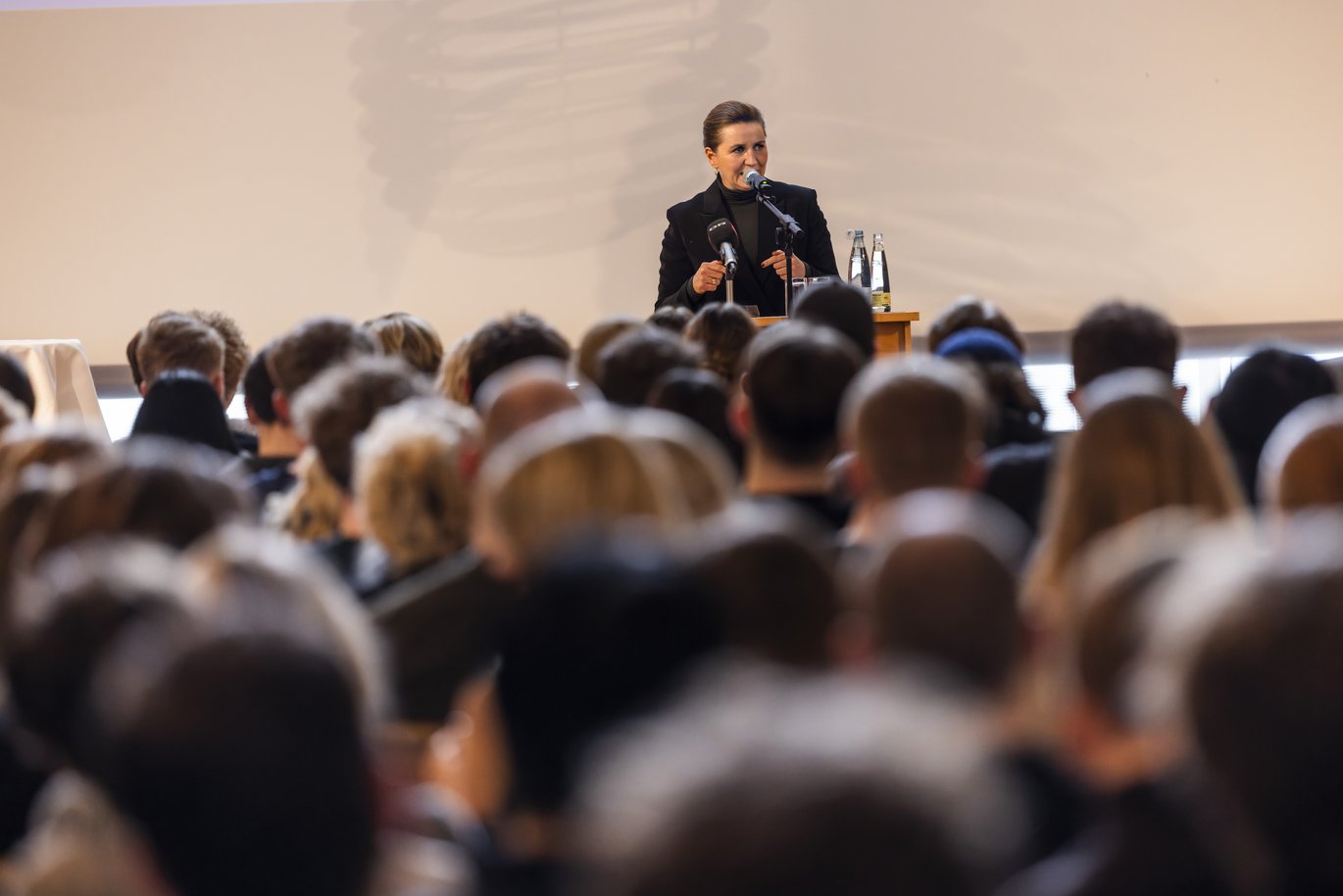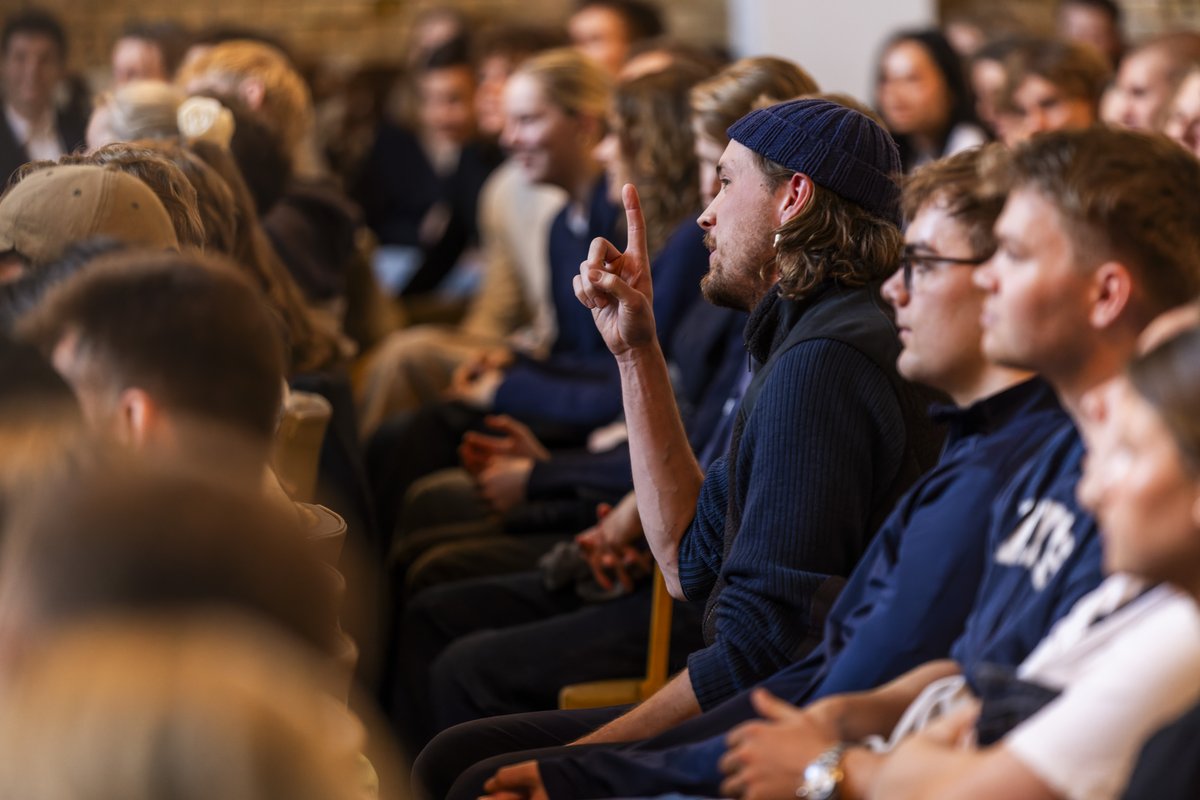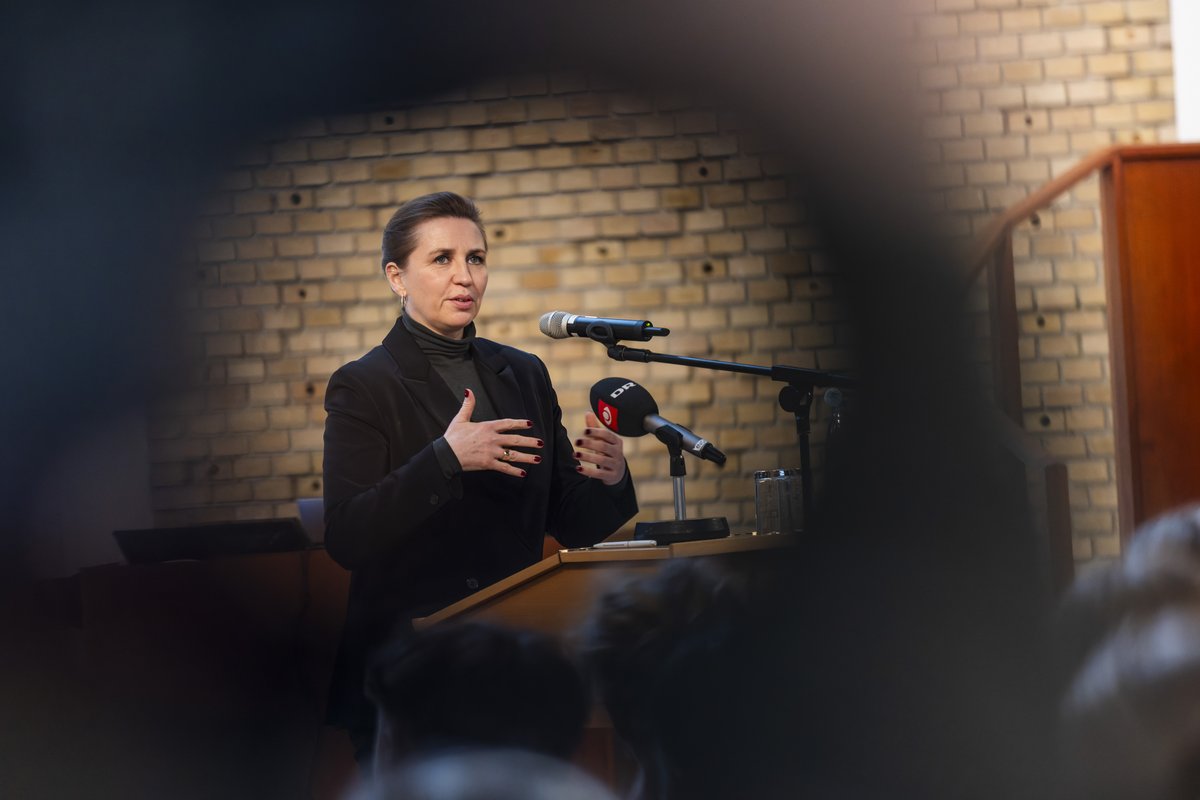Prime Minister visits AU: "We all understand how serious this is now - that goes for everyone here in this auditorium"
On Monday, March 3rd, Prime Minister Mette Frederiksen met with students at Aarhus University for a serious debate on security policy and the future of Europe. Now is not the time for analysis, but for taking action, said the prime minister, calling the current situation in Europe the most dangerous of her lifetime.

Less than 24 hours after attending a summit in London with British Prime Minister Keir Starmer and other European leaders to discuss support for Ukraine, Prime Minister Mette Frederiksen (Social Democrats) arrived at Aarhus University on Monday afternoon for a debate on security policy and the future of Europe.
The auditorium was packed with students, who first listened to a 10-minute presentation from Mette Frederiksen before they had the opportunity to ask her questions.
The Prime Minister's speech was serious, but she emphasised the importance of talking about the security situation.
"I believe that the change that’s happening in our world is so profound that simply coming together, chewing it over, and gaining a deeper understanding of what is unfolding is important if we want to ensure a strong democracy in the future. I have no doubt that we are in the most dangerous security policy situation of my lifetime and therefore also of yours. I think that applies to almost everyone in the room," said Mette Frederiksen, who wove a phrase she’s said several times in recent months into her remarks:
"I’m not saying this is wartime, but I cannot say it’s peacetime either."
“The Americans are adding to the uncertainty”
The general intelligence picture is that Russia within a few years will become a credible threat to NATO countries, explained Mette Frederiksen. And so the war in Ukraine is not just about Ukraine: it’s also about the rest of Europe. The Prime Minister is worried, but Denmark is now taking action.
"We’ve been doing quite well for many years. There are plenty of challenges in Europe, but compared to other times, these years have been stable. We have had less defence spending because the US has been willing to help us. European defences have been cut back. So this means we’re really busy. If Russia is a real threat, then I see no other way to avoid war than massive rearmament. It may sound counterintuitive, but the prerequisite for not going to war again is NATO and deterrence.If you attack one of us, you attack us all," she said.
The European leaders she met with in London on Sunday stand united in guiding Europe through the situation, as the Prime Minister put it. However, since President Donald Trump took office, the position of the United States has become harder to figure out.
“The Americans are adding to the uncertainty. I don’t know which way they’ll go. It's difficult to tell," said the prime minister.
A student wanted to know whether anything in the U.S.'s actions had made her reconsider cooperation with them. The student described the actions of the United States following Trump's inauguration as revealing the country’s true colours.
"Where this will leave Europe and the US, none of us really know. I think you understand why there are things I can say, and things I cannot. I was saddened by what I saw on Friday in the Oval Office, and the way that meeting took place. If what we are seeing now is a change in our world order, it is alarming beyond words and could have fatal consequences for all of us. I'm just not in control of what happens in the US. We need to focus on making Europe as strong as possible. I'm not going to end the alliance with the US, but I have no way of knowing what the Americans will do”, Mette Frederiksen said.
"I don't spend time on being a political commentator"
Although the prime minister repeatedly approached analysing the situation in Europe, or at least communicating analyses, she repeatedly emphasised that the time is not right for this.
"I don't spend time on being a political commentator. There are plenty of those. I spend my time taking action. I believe in Europe. If we get it right now, Europe can come out of this stronger," said the prime minister.
But it's going to require "an insane amount of effort from all of us", she explained. It's about military build-up, which means significantly more money on the military and security. A statement that brought with it multiple reactions, and multiple questions naturally revolved around the nature of the amarment and which societal consequences would follow. One student elaborated in his question that these times call for difficult and wise measures - something universities deal with - and that it worries him that the Prime Minister has said "buy, buy, buy" to the Chief of Defence. Something she repeated on Monday in the Main Hall at AU. The student wanted to know whether the military build-up funds would also be invested in knowledge or only in weapons.
"If I said: "Analysis, analysis, analysis", then you really would have reason to be worried, because that would mean you would end up speaking Russian at some point in your life," said the prime minister, whose comment was met with scattered laughter and surprised faces before she concluded:
"That last one was a joke."
Moderator Rasmus Brun Pedersen, associate professor of political science, interrupted her with a smile.
"As a university employee, I was just about to say: 'We need more of these analyses’,” the associate professor said, before Mette Frederiksen responded:
"There are also a lot of academics who are really good at doing analyses. And you're welcome to make analyses. It's just great when you make them at a time when they can be used for something. And they just can't right now. We don't have time for that right now. When it comes to combat power, our defence force knows exactly what we need. “So I’m not worried about it. Mistakes will occur, of course. In the years to come, some wise people will wonder why we bought exactly that air defence system when it might have been better to buy another one, and that will be an interesting discussion," said the prime minister.
A message of hope: We will get through this together
Mette Frederiksen ended the debate with an uplifting remark.
"What I brought with me here to Aarhus isn’t exactly cheerful. But we'll get through it. We must stand together. Then we'll get through it. I'll do everything I can to ensure we do," she said.
After the debate, the prime minister explained why she chose to visit Aarhus University in an otherwise busy programme.
"It's to hear about what young people are interested in, and of course because I want to be present in as many places as possible. Abroad, in Europe, but also at home. And it's a time of great change, and it's important that we have a good conversation with each other."
What did you get from it?
"I got some really good questions, but I can also sense that the whole room is concerned about what is happening in the world, and we all understand how serious this is now - that also goes for everyone here in this auditorium.”
The situation will require something more from all of us, you say. What will it require of the students?
"It's not a message just for students or just for you as a journalist or for anyone else, but look at it a different way: Is it imaginable for us to rearm, make our society more sustainable, have immigration under control, strengthen our competitiveness, all at the same time, without it demanding something from all of us? It's very, very hard to imagine. But we don't know the exact path yet. I think I’ll say it more like: “If Europe wants to get through the very difficult situation we have been placed in, it requires that we stand tall, join hands and stick together'," said Mette Frederiksen.
This text is machine translated and post-edited by Cecillia Jensen.




